By Mike Haen (and the Cross-Institutional Research Team)
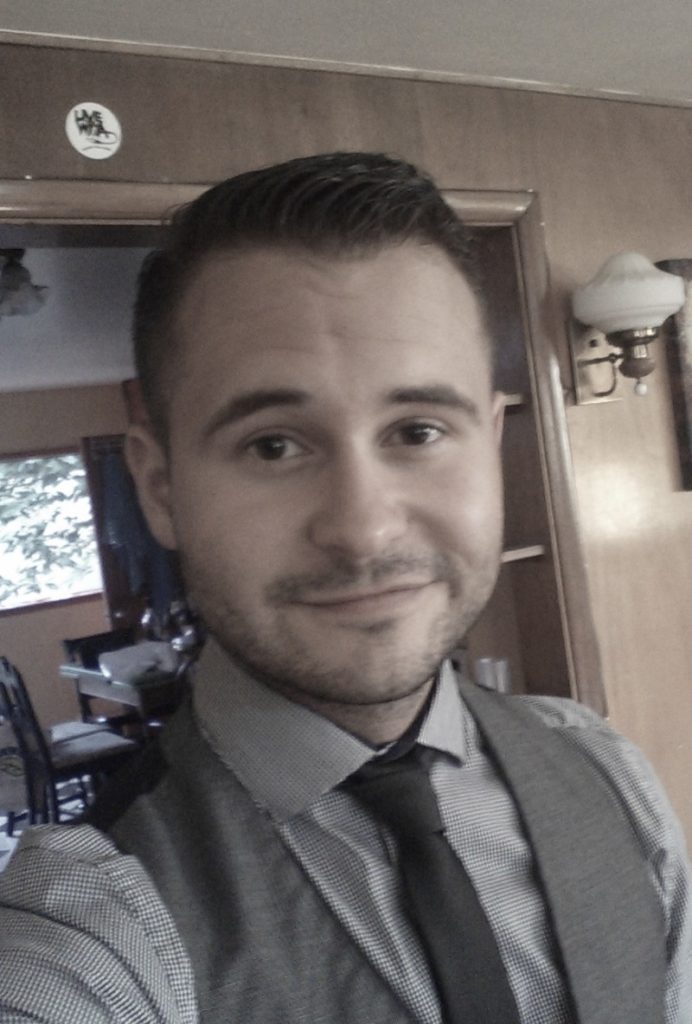
In this post, I want to share some exciting details about a grant-funded, cross-institutional research project that a group of colleagues and I recently discussed during a session at the International Writing Centers Association Conference (IWCA) [broken link removed]. The session—a Special Interest Group (SIG)—introduced our goal of developing a large data repository for writing center texts, like tutorial session transcripts, session notes, and other data or artifacts collected through everyday writing center work, institutional assessment, and research projects.
Ideally, this repository would allow writing center researchers and practitioners from around the world to access large amounts of data and to contribute their own data to an ever-evolving corpus of texts and artifacts. The repository could be used for research purposes (e.g., by undergraduates, graduate students, professionals) as well as for training purposes. Though the plan is to start with transcripts of consultations, we hope to create space for audio and video recordings in the repository, as well as other kinds of artifacts (e.g., asynchronous comments on student writing; transcripts and recordings of workshops) that can be analyzed with corpus-based methods and a range of other qualitative and quantitative methods. The overall goals are to expand what we know about writing center work in a data-driven manner and to do so, in part, by forming sustainable research networks.
I only recently learned of this project in spring 2019 after attending Jo Mackiewicz’s presentation on “Writing Center Talk Over Time: A Corpus-Driven Analysis” at the Conference on College Composition and Communication (CCCC). Soon after that, I connected with the group and started to contribute to the ongoing work of these stellar researchers:
- Rebecca Day Babcock (University of Texas-Permian Basin)
- Alicia Brazeau (College of Wooster)
- Joseph Cheatle (Iowa State University)
- Joseph Cheatle (Iowa State University)
- Genie Giaimo (Middlebury College)
- Rebecca Hallman Martini (University of Georgia)
- Jo Mackiewicz (Iowa State University)
- Christine Modey (University of Michigan)
- Randall W. Monty (University of Texas Rio Grande Valley)
The current group began as two separate groups a few years ago—one group with the idea for a repository of tutorial transcripts and another with the idea for a repository of session notes.
What Makes a “Moonshot”?
If the vision for this project seems ambitious, it’s because it is. To quote Brad Hughes (former writing center director at UW-Madison), it could be described as a “moonshot”—a term coined by President John F. Kennedy in a 1961 speech that committed to landing a man on the moon by 1970. In his 2016 keynote address at the Midwest Writing Center Association (MWCA Conference), Hughes describes moonshots in writing center work. The term refers to very “ambitious” and “audacious” goals or projects and the “difficult process in achieving them.” Toward the end of his address, Hughes calls on writing center practitioners and leaders to set ambitious goals (as instructors and administrators) around inclusion, transfer, and writing across the curriculum.
The cross-institutional “moonshot” described here will demand extensive collaboration across individuals and institutions and raises ethical considerations (which I touch on later). But we believe it is something worthy to pursue because of the benefits it can bring to our field. Specifically, a large repository would have two advantages:
- enable qualitative and quantitative researchers to ask large-scale questions and investigate some phenomenon without having to collect new or “fresh” data
- develop a deeper understanding of intellectual and pedagogical work we do as a community of practice across institutions, and perhaps, create generalizable knowledge
The Evolving Idea of a Repository
During our SIG at IWCA, we introduced the origins of this cross-institutional project, which grew from two earlier projects: one that collected a total of 30 consultation transcripts and another about 44,000 session notes (see Giaimo, Cheatle, Hastings, & Modey, 2018) [broken link removed]. The session notes project and cross-institutional project both received an IWCA Research grant of $1,000 to work with data and develop repositories. Funded in 2018, the first project, examined session notes and is in the process of creating a repository of session notes, session note templates, and other session note data.
The second project, which received a grant just prior to the IWCA 2019 conference, involves “cleaning up” the thirty transcripts that team members had previously collected. This “cleaning up” involves standardizing transcription conventions across the transcripts and providing metadata for each transcript, including tutor gender, writer gender, tutor class rank, writer class rank, tutor language, writer language, course or subject of paper, genre of paper, type of institution, etc.
Though these more technical details of the projects and their respective data-collection processes are important, our IWCA SIG mainly focused on brainstorming and discussing cross-institutional research with attendees. We asked them to consider the following questions, as a way to stimulate thinking about the vision for the repository and their role in contributing to it.
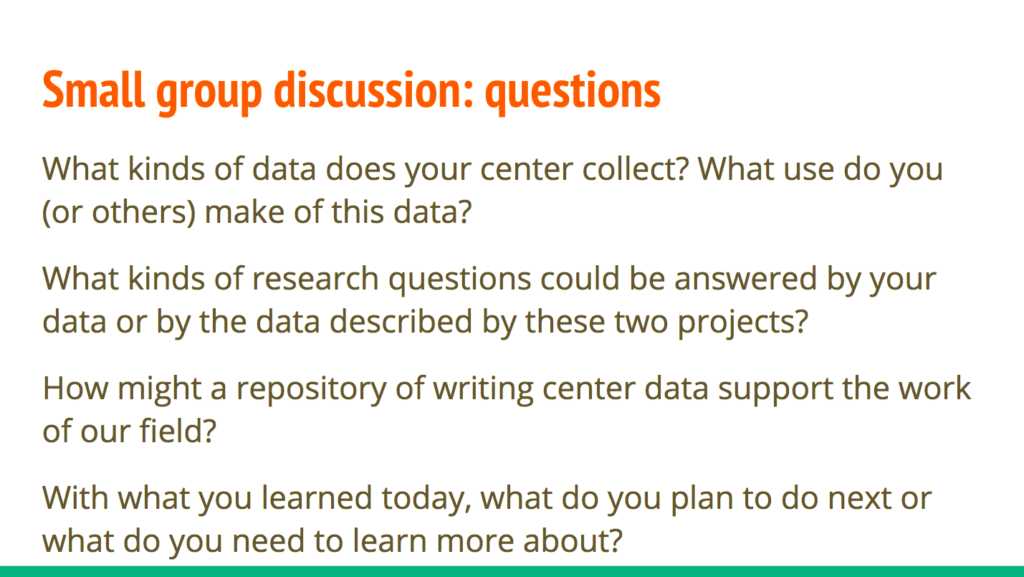
We were excited to see that small groups discussed ideas beyond transcripts and session notes by thinking about other kinds of data, including survey responses, being collected at their centers. Attendees discussed the value of a repository or database that could allow them to discover what other centers are doing (and finding) at institution types similar to their own. Other groups discussed potentials for research collaborations with programs within their respective institutions, such as information systems, computer science, and linguistics. We believe this sort of work that can lead to sustained partnerships across programs, which can further demonstrate the efficacy of writing centers.
What Kind of Work Can Be Done with a Repository?
Here are two examples:
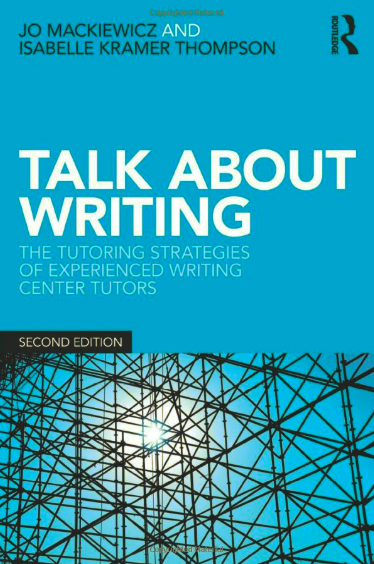
First, small-scale linguistic research has greatly impacted writing center studies and provided valuable insight into how peers work together and learn from one another. In Talk About Writing: The Tutoring Strategies of Experienced Writing Center Tutors, Mackiewicz and Thompson (2018) systematically analyzed talk in writing conferences between experienced tutors and student writers, focusing their analysis on three key tutoring strategies: instruction, cognitive scaffolding, and motivational scaffolding. While their study is significant, it is based on only ten writing center conferences conducted at one institution. With a larger repository of session transcripts, this important study could serve as a model for additional replicable and larger-scale research that looks at more tutoring sessions across a range of institutions.
To take another example, corpus analysis and discourse analysis of session notes provides insight into how writing tutors conceptualize the work they do and how they communicate about that work with others—colleagues, students, faculty. The collection of session notes in the repository would allow writing center administrators to see examples of common types of documentation in order to produce tailored forms for their individual institutions and would also provide a corpus of notes that could be analyzed in various ways to better understand how the discourse of session notes reflects the work of our field. An example of the insights available through analysis of session notes appears in the Journal of Writing Analytics.
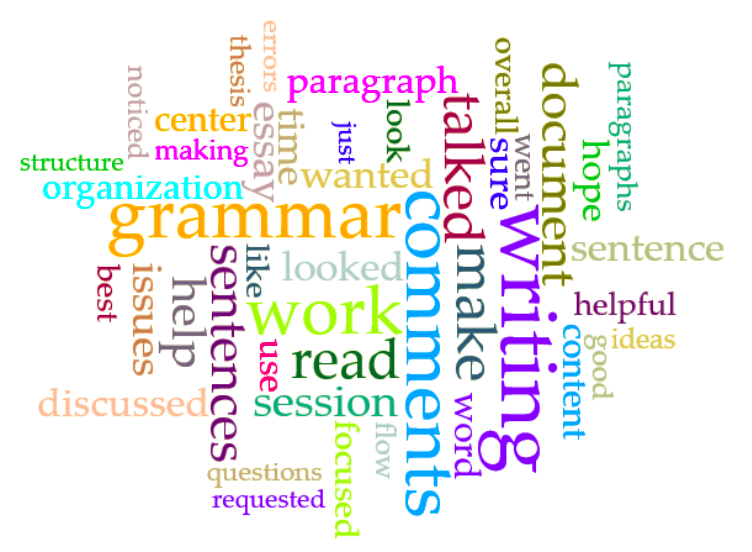
Future projects using the repository could address substantial gaps in the field’s literature, such as the extent to which talk “revolves around” various components of the writing process, including “developing a main point, organizing and reorganizing content, revising sentences, and editing punctuation” (Mackiewicz & Thompson, 2016, p. 189). That is, research using the repository could explore possible reasons for interactional patterns–reasons stemming from contextual and cultural variables, such as tutor and writer class rank and gender, which would be provided in the repository data. Another inquiry, which was discussed in one small group, could explore seemingly simple, yet complex notions like “flow,” and how tutors and writers construct and understand “flow” in tutorial interaction and session notes across institutions.
Some Potential Challenges
As I alluded to earlier, there are challenges and potential pitfalls to this collaborative, cross-institutional work, including issues around collecting data, navigating IRB and FERPA rules, and processing, storing, and accessing data. Given that writing center tutoring sessions necessarily involve interactions including students, some of whom may be from at-risk populations or groups otherwise traditionally underrepresented within higher education, there are ethical and legal constraints that our group has considered and continues to think about.
Our group has developed initial protocols to ensure participant anonymity in the repository. All researchers, whether submitting transcripts or accessing the corpus, will need to register, at no cost, through our computer center partner’s website with a verifiable email address. Researchers submitting data will need to provide evidence that their data collection methods were approved by their local Institutional Review Board (IRB). All collected data will need to be deidentified prior to inclusion in the corpus. Each of these standards is consistent with IRB standards at our team’s respective institutions, as well as with journal submission protocols and disciplinary ethos within writing center studies. And we are still fine-tuning the repository’s protocols, but believe we have developed a strong conceptual foundation for data-sharing at this stage of the project.
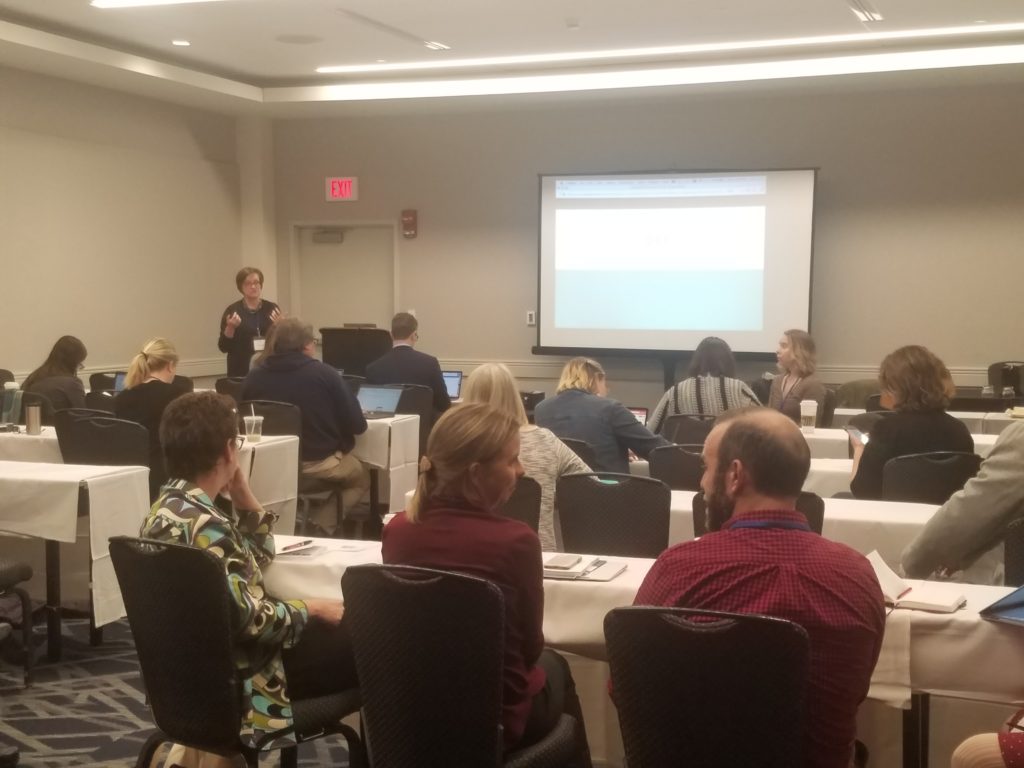
Finally, we know sustaining the repository over the long-term will be a challenge. In some small-group discussions during the SIG, attendees mentioned the possibility of establishing a permanent body within IWCA to sustain the repository by regularly updating research standards, cleaning data, and recruiting volunteers to manage the repository. In the future, we want to explore making the SIG a Standing Group, which means we’d hold a session every year to discuss progress and plans for the repository project. Looking to the long-term, we plan to seek out and apply for more grant funding to develop the data repository (with the help of computing research center) as a searchable database available to the writing center community.
Making this “Moonshot” a Reality
In an era of “big data” within higher education, we think this cross-institutional project can make a significant contribution to advancing knowledge and advocating for the value of writing center work. Help us make this “moonshot” a reality. If you would like to learn more about the project or if you have a comment, concern, or question, please send a message to WCdatarepository@gmail.com and/or comment on this post. Finally, if you’re looking for guidance in starting a research project, navigating IRB, or ethically collecting data to share in a future repository [broken link removed].
*Featured image from Getty Images. Thank you to the cross-institutional team for their contributions to this post.


Mike, I could hardly finish reading this post I was so excited about this project and all its possibilities. Especially as a new director in a new institution, having access to a repository like this would not only mean having a wealth of resources for training that I’m otherwise having to slowly build myself but would also help me to envision all kinds of new, creative ways to build our center. I hope you’ll put me on the list for updates and let me know how I can get more involved!
Leigh Elion
Director of the Writing Center
Oxford College, Emory University